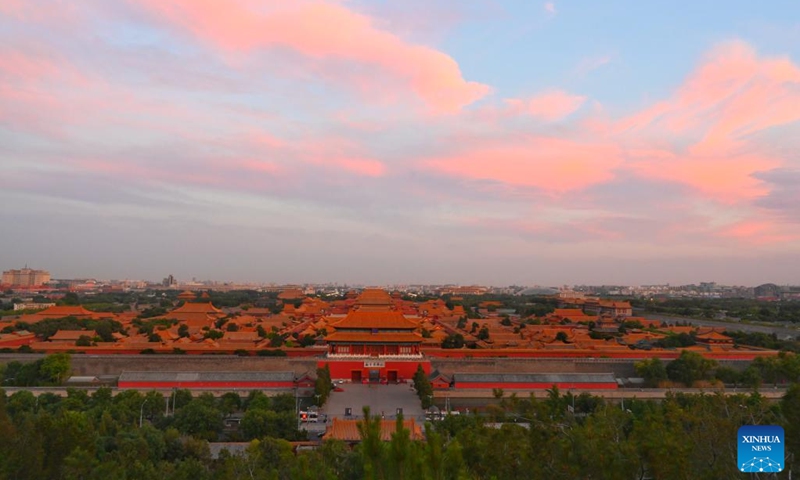
This photo taken on June 7, 2023 shows the view of sunset glow over the Palace Museum in Beijing, capital of China.(Photo: Xinhua)
The 6th Taihe Forum kicked off at the Palace Museum on Monday. Wang Xudong, director of the Palace Museum, stated during the opening ceremony that the museum has digitized over 900,000 items from its collection, establishing a vast digital resource library for the museum.
He explained that the digital Palace Museum is a product of the digital age. The Chinese team has digitized over 900,000 items from the collection of the museum and over 100,000 high-definition images of these artifacts are now accessible to the public. The basic image capture of the most key historical buildings within the Forbidden City has also been finished.
"Over the years, by expanding our openness, we have welcomed audiences from various countries worldwide in the hopes that more people can come to understand the 5,000 years of Chinese culture through the Palace Museum," said Wang.
The Palace Museum houses over 1.8 million diverse cultural artifacts, including royal collections from various dynasties sourced from imperial collections and production. Additionally, the Palace Museum represents a convergence of diverse cultures, allowing visitors to explore Buddhist, Taoist, and shamanistic influences and also traces of Western cultural influence from some buildings and cultural relics in the museum, the Beijing News reported on Monday.
The two-day forum, whose theme is "International Exchange, Cooperation and Sharing in Cultural Heritage Conservation," serves as a vital platform for international academic exchanges in cultural heritage preservation and promoting exchanges, cooperation, and experience sharing in international cultural heritage protection. Many foreign experts shared their insights on this forum's theme.
Juergen Vervoorst, vice president of International Institute for Conservation of Historic and Artistic Works, told the Global Times on Monday that China is great at driving forward with incredible speed, and seems to be greatly focused on the protection of cultural heritage, which is pursued with "energy, enthusiasm and resources."
Terry Simioti Nyambe, vice president of the International Council of Museums, told the Global Times on Monday that the Taihe forum offers a great opportunity for museum and heritage professionals around the world to meet and discuss cultural heritage protection.
"There is a need to have synergy in protecting cultural heritage around the world," he said, adding that there is a lot of diversity in the world, but this diversity is "what unites us as people, because we learn to respect each other's culture."
According to Nyambe, currently, the world is experiencing a lot of challenges, including wars, natural calamities, earthquakes, floods, and so organizations and international institutions must work together to help other states protect their heritage.
When it comes to wars like the current Israeli-Palestinian conflict, the international organization like the International Council Museums have a network of professionals who could help to give advice to these colleagues to protect their heritages, and help them package important cultural property to move to safe places.
"At this moment, it is still a challenging period. We as an international organization are putting an ear to the ground and waiting to hear from colleagues and then assess how best we can do to help them," he said.
Nyambe said amid the Russia-Ukraine crisis, the Ukraine side has contacted the organization to express the challenges they face.
"We have to depend on people inside to tell us what the current situation is. And as you may know, it may not be easy to just move in. And at this stage in the situation, it becomes a little bit tricky because the most prime purpose for now is saving lives, and at a certain time it will come to that particular step [to protect heritage]," he said.




